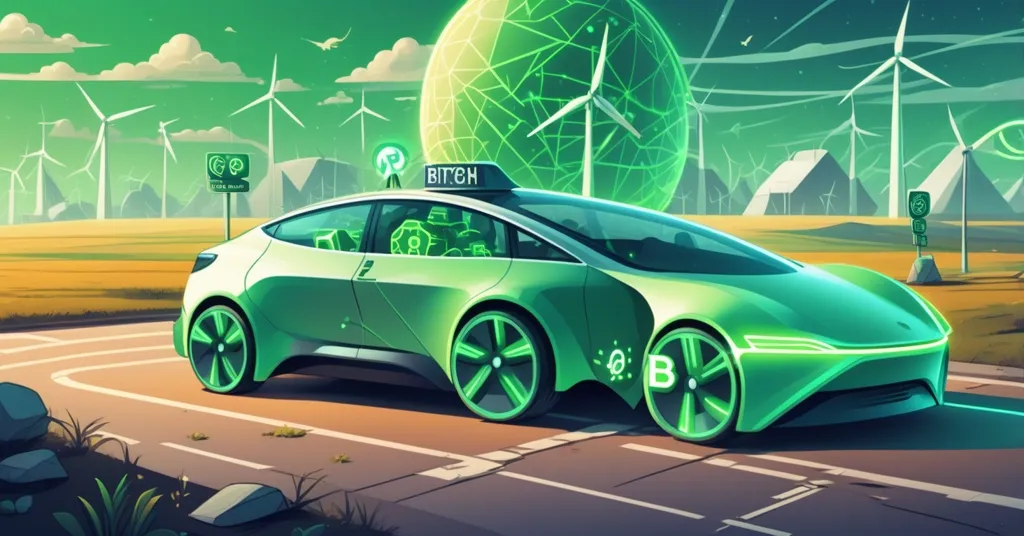Tesla’s $17B Bitcoin Miss: Blunder or Bold Stand on Green Principles?

Tesla’s $17 Billion Bitcoin Blunder: A Missed Fortune or a Principled Stand?
Tesla, the electric vehicle juggernaut helmed by Elon Musk, could be sitting on a Bitcoin stash worth over $17 billion today if it hadn’t slammed the brakes on accepting BTC payments in 2021. This isn’t just a corporate “what if”—it’s a stark lesson in the high-stakes game of crypto adoption, where idealism and profit collide with brutal consequences.
- Hypothetical Windfall: Tesla could have amassed 160,000 BTC, valued at over $17 billion, by accepting just 2% of car sales in Bitcoin since 2021.
- Environmental Clash: Musk halted BTC payments over mining’s hefty energy use and carbon footprint, aligning with Tesla’s green ethos.
- Future Speculation: Musk’s recent crypto-friendly signals keep rumors of a Tesla Bitcoin comeback alive, though no firm plans exist.
The Numbers Behind Tesla’s Missed Crypto Fortune
Back in early 2021, Tesla sent shockwaves through the financial world by accepting Bitcoin as payment for its vehicles, hot on the heels of a $1.5 billion investment in the cryptocurrency. It was a bold nod to BTC’s potential as real-world money, not just a speculative asset. But the romance was short-lived. On May 12, 2021, Elon Musk announced Tesla would suspend Bitcoin payments, citing environmental concerns tied to its mining process. At that moment, Bitcoin traded at around $56,667. Within just 11 days, the price tanked nearly 39%, a brutal illustration of Musk’s market-moving clout—often dubbed the “Musk Effect.”
Now, with Bitcoin soaring to $108,826—a jaw-dropping 88.9% year-over-year surge—the missed opportunity stings harder than ever. Tomas Grief, Chief Product Officer at Brainns, ran the numbers: if Tesla had stuck with accepting Bitcoin for just 2% of its car sales since 2021 and held onto those coins, it could now own roughly 160,000 BTC. At current prices, that’s over $17 billion, a sum that equates to 42.5% of Tesla’s reported $40 billion in total profits over the same period. To put that in perspective, $17 billion isn’t just a rounding error—it’s enough to bankroll massive R&D projects or build entire new Gigafactories. Tesla didn’t just miss a chance; they missed a financial empire, as highlighted in a detailed analysis of Tesla’s potential Bitcoin earnings.
But let’s unpack that 2% figure. Tesla has sold millions of vehicles since 2021, with annual sales figures hovering around 1.2 to 1.8 million units in recent years and an average car price of about $45,000. If just 2% of those transactions were paid in Bitcoin—say, 24,000 to 36,000 cars annually—the BTC accumulated at varying prices over the years could plausibly hit Grief’s estimate, especially with Bitcoin’s price appreciation. While the exact calculation remains speculative without Tesla’s precise sales data, the scale of the potential haul is undeniable. It’s a gut punch to any shareholder watching Bitcoin’s meteoric rise, underscored by insights into Tesla’s missed corporate Bitcoin strategy.
Why Musk Hit the Brakes: Bitcoin’s Dirty Secret
So, what drove Musk to pull the plug? The official reason was Bitcoin mining’s environmental toll, a sticking point for a company built on sustainability. For the uninitiated, Bitcoin runs on a mechanism called Proof-of-Work (PoW), where miners worldwide compete to solve complex mathematical puzzles to validate transactions and secure the network. Think of it as a global brain-teaser contest where computers burn massive amounts of energy for a shot at winning Bitcoin rewards. The catch? This process guzzles electricity—sometimes rivaling the consumption of entire nations like Ukraine or Poland. Historically, a chunk of that power has come from fossil fuels, especially coal, pumping out carbon emissions, generating electronic waste from outdated hardware, and straining water and land resources.
Musk laid it out clearly in 2021, a decision detailed in a report on Tesla’s 2021 suspension of Bitcoin payments:
“Cryptocurrency is a good idea on many levels… but this cannot come at great cost to the environment.”
That reasoning synced with Tesla’s mission to combat climate change through electric vehicles. Fair enough—at first glance. But scratch the surface, and the picture gets messier. Bitcoin mining isn’t a monolith stuck in 2021. Studies now estimate that 39% to 74% of its energy comes from renewable sources, depending on the methodology. Efforts to green the industry are picking up, from hydroelectric mining operations in Canada to innovative projects in Texas using flare gas—excess natural gas from oil drilling that would otherwise be wasted—to power rigs. Concepts like BTC tagging, where coins are labeled as “green” if mined with renewables, and subsidies for eco-friendly miners are gaining traction, as explored in recent research on Bitcoin mining sustainability trends. If Musk’s condition for resuming payments was a shift to “more sustainable energy,” as he hinted, isn’t the industry inching closer to that line?
Hypocrisy or Principle? Tesla’s Environmental Dilemma
Here’s where skepticism creeps in. Tesla’s laser focus on Bitcoin’s carbon footprint feels a tad selective when you consider the environmental baggage of electric vehicle production itself. Mining lithium, cobalt, and other materials for EV batteries is energy-intensive and often tied to questionable labor and ecological practices. Manufacturing a single Tesla battery can emit as much CO2 as driving a gas-powered car for years, according to some estimates. So, was Bitcoin an easy target for Musk to signal virtue while dodging scrutiny of his own supply chain? Or was this a genuine stand for a greener future across all tech? Crypto critics call it hypocrisy; defenders argue it’s a consistent push for accountability. The truth likely lies in the murky middle, but it’s a debate worth having, with community perspectives shared on platforms like Reddit discussing Tesla’s Bitcoin suspension reasons.
Moreover, Musk’s environmental stance hasn’t been static. While Tesla hasn’t resumed Bitcoin payments, the company sold off 75% of its $1.5 billion BTC holdings in 2022, citing liquidity needs amid market uncertainty. That move muddied the waters—was the environmental excuse just a convenient out, or did it mask deeper doubts about Bitcoin’s stability as a corporate asset? Either way, Tesla’s crypto strategy feels less like a principled playbook and more like a series of knee-jerk pivots, with further insights available through discussions on why Musk halted Bitcoin payments.
Musk’s Crypto Flirtations: A Tesla Comeback on the Horizon?
Despite the silence from Tesla’s boardroom, Musk’s personal antics keep the rumor mill churning. His newly formed political group, the “America Party,” plans to accept Bitcoin donations—a loud endorsement of decentralization and a jab at traditional finance. On X, Musk has doubled down, declaring:
“Fiat is hopeless.”
That’s catnip for Bitcoin maximalists who see government-issued money (fiat currency, like the US dollar) as a crumbling relic ripe for disruption. Add in new accounting rules that let companies report gains on Bitcoin holdings without marking them down during dips, and the financial incentive for Tesla to dive back into BTC looks stronger than ever. Could this be the prelude to Tesla accepting Bitcoin payments again, or is Musk just tossing red meat to his crypto fanbase while Tesla stays firmly out of the game? Recent updates on Musk’s crypto statements and political moves shed light on this speculation.
Let’s not get carried away. Musk’s political side hustle, while flashy, is a wildcard at best. Critics like James Fishback of Azoria Partners have been scathing, arguing that Musk’s divided attention “actively undermines” Tesla’s core mission. Tesla’s stock has taken hits tied to his extracurricular chaos, and delayed investments in key projects don’t help. Then there’s the regulatory angle—U.S. crypto policies remain a patchwork, and any shift under a new administration could either greenlight corporate adoption or slap it with red tape. Musk’s anti-fiat rants might play well on X, but translating that to Tesla policy is a gamble with real-world hurdles.
The Bigger Picture: Bitcoin, Corporations, and Disruption
Zoom out, and Tesla’s $17 billion fumble isn’t just about one company’s balance sheet—it’s a microcosm of the broader clash between crypto’s promise and its pitfalls. Bitcoin, with a market cap topping $1.3 trillion, isn’t just digital gold; it’s a hedge against inflation, a revolt against centralized banking, and a building block for a new financial order rooted in freedom and privacy. Tesla dipping back into BTC payments wouldn’t just be a transactional tweak—it could signal a strategic alignment with decentralization, embodying the “effective accelerationism” ethos of pushing tech-driven progress at full throttle. For a deeper dive into Tesla’s history with Bitcoin investments, the context is well-documented.
Compare Tesla’s hesitation to MicroStrategy, a software firm that’s gone all-in on Bitcoin as a treasury asset, amassing over 226,000 BTC worth billions under Michael Saylor’s leadership. Their bet has paid off handsomely during bull runs, though not without stomach-churning volatility. Tesla’s initial foray in 2021 inspired other corporations to flirt with crypto, but its abrupt exit cooled enthusiasm for many. If Musk reverses course, it could reignite a wave of corporate Bitcoin adoption—or flop spectacularly if environmental critics and market swings bite back, especially given the ongoing scrutiny of Musk’s concerns over Bitcoin’s environmental impact.
Here’s the rub: Bitcoin’s volatility is a double-edged sword. A $1.3 trillion market cap screams opportunity, but wild price swings could wreak havoc on a corporate balance sheet. Shareholders might cheer a BTC windfall today only to scream bloody murder during a 50% crash tomorrow. And environmental backlash isn’t going away—green mining or not, critics will pounce if Tesla backtracks without bulletproof proof of sustainability. It’s a tightrope walk between visionary disruption and reckless gambling.
Key Takeaways: Unpacking Tesla’s Bitcoin Saga
- What did Tesla potentially lose by ditching Bitcoin payments?
Tesla could have held 160,000 BTC worth over $17 billion—42.5% of its total profits since 2021—if it had accepted just 2% of car sales in Bitcoin and kept the coins. - Why did Tesla stop accepting Bitcoin in 2021?
Elon Musk pointed to Bitcoin mining’s environmental impact, including massive energy use and reliance on fossil fuels, which clashed with Tesla’s sustainability mission. - Is Bitcoin mining still an environmental issue?
Partly—while 39-74% of mining energy may be renewable, fossil fuel use and electronic waste remain problems, though innovations like green tagging and hydroelectric mining offer hope. - Could Tesla resume Bitcoin payments in 2024 or beyond?
There’s no official word, but Musk’s anti-fiat comments, political crypto moves, and favorable accounting rules for BTC gains fuel speculation, despite risks from his divided focus. - Should companies like Tesla embrace Bitcoin despite the challenges?
It’s a high-risk, high-reward play—Bitcoin aligns with decentralization and offers inflation protection, but volatility, regulatory uncertainty, and green concerns could hit hard.
Tesla’s $17 billion Bitcoin miss might end up a mere footnote in the annals of corporate missteps, or it could stand as a glaring blueprint for how not to navigate the crypto frontier. Was Musk’s environmental stand a prescient move history will vindicate, or a colossal blunder born of short-sightedness? Only time—and perhaps Musk’s next unhinged X post—will tell.



